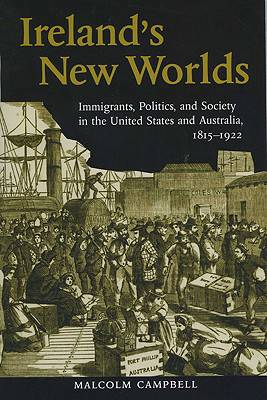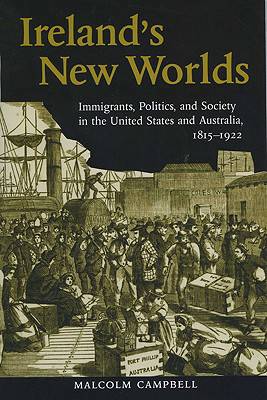
- Afhalen na 1 uur in een winkel met voorraad
- Gratis thuislevering in België vanaf € 30
- Ruim aanbod met 7 miljoen producten
- Afhalen na 1 uur in een winkel met voorraad
- Gratis thuislevering in België vanaf € 30
- Ruim aanbod met 7 miljoen producten
Zoeken
Ireland's New Worlds
Immigrants, Politics, and Society in the United States and Australia, 1815?1922
Malcolm Campbell
€ 40,45
+ 80 punten
Omschrijving
In the century between the Napoleonic Wars and the Irish Civil War, more than seven million Irish men and women left their homeland to begin new lives abroad. While the majority settled in the United States, Irish emigrants dispersed across the globe, many of them finding their way to another "New World," Australia.
Ireland's New Worlds is the first book to compare Irish immigrants in the United States and Australia. In a profound challenge to the national histories that frame most accounts of the Irish diaspora, Malcolm Campbell highlights the ways that economic, social, and cultural conditions shaped distinct experiences for Irish immigrants in each country, and sometimes in different parts of the same country. From differences in the level of hostility that Irish immigrants faced to the contrasting economies of the United States and Australia, Campbell finds that there was much more to the experiences of Irish immigrants than their essential "Irishness." America's Irish, for example, were primarily drawn into the population of unskilled laborers congregating in cities, while Australia's Irish, like their fellow colonialists, were more likely to engage in farming. Campbell shows how local conditions intersected with immigrants' Irish backgrounds and traditions to create surprisingly varied experiences in Ireland's new worlds. Outstanding Book, selected by the American Association of School Librarians, and Best Books for Special Interests, selected by the Public Library Association
"Well conceived and thoroughly researched . . . . This clearly written, thought-provoking work fulfills the considerable ambitions of comparative migration studies."--Choice
Ireland's New Worlds is the first book to compare Irish immigrants in the United States and Australia. In a profound challenge to the national histories that frame most accounts of the Irish diaspora, Malcolm Campbell highlights the ways that economic, social, and cultural conditions shaped distinct experiences for Irish immigrants in each country, and sometimes in different parts of the same country. From differences in the level of hostility that Irish immigrants faced to the contrasting economies of the United States and Australia, Campbell finds that there was much more to the experiences of Irish immigrants than their essential "Irishness." America's Irish, for example, were primarily drawn into the population of unskilled laborers congregating in cities, while Australia's Irish, like their fellow colonialists, were more likely to engage in farming. Campbell shows how local conditions intersected with immigrants' Irish backgrounds and traditions to create surprisingly varied experiences in Ireland's new worlds. Outstanding Book, selected by the American Association of School Librarians, and Best Books for Special Interests, selected by the Public Library Association
"Well conceived and thoroughly researched . . . . This clearly written, thought-provoking work fulfills the considerable ambitions of comparative migration studies."--Choice
Specificaties
Betrokkenen
- Auteur(s):
- Uitgeverij:
Inhoud
- Aantal bladzijden:
- 264
- Taal:
- Engels
- Reeks:
Eigenschappen
- Productcode (EAN):
- 9780299223342
- Verschijningsdatum:
- 1/02/2008
- Uitvoering:
- Paperback
- Formaat:
- Trade paperback (VS)
- Afmetingen:
- 179 mm x 228 mm
- Gewicht:
- 358 g

Alleen bij Standaard Boekhandel
+ 80 punten op je klantenkaart van Standaard Boekhandel
Beoordelingen
We publiceren alleen reviews die voldoen aan de voorwaarden voor reviews. Bekijk onze voorwaarden voor reviews.











